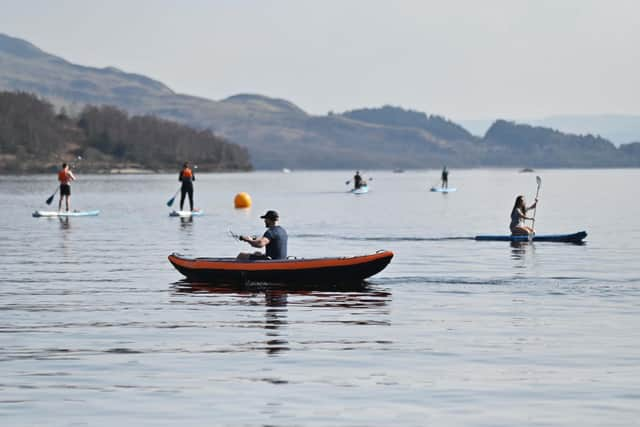Warning over health impacts as Scotland’s lochs and reservoirs heat up due to climate change
Experts have warned there could be a higher risk of toxic algal blooms developing as a result of the warming waters, which could restrict their use for drinking water supplies, leisure activities and as a safe habitat for wildlife.
A report by Scotland’s Centre of Expertise for Waters shows the temperature of water in 97 per cent of Scottish lochs and reservoirs tested has risen between between 2015 and 2019.
Advertisement
Hide AdAdvertisement
Hide AdMeasurements show most warmed by up to 1C each year over this period. Nearly one in ten saw even bigger increases – some by up to 1.3C annually.
It is expected water bodies in the south and east of Scotland will warm fastest at first, but all parts of the country will be affected by 2040.
The report makes a number of recommendations to address these impacts in the immediate term, as well as planning further research to improve understanding the consequences of climate change on the complex functioning of lochs and reservoirs.
Freshwater ecologist Dr Linda May of the UK Centre for Ecology & Hydrology, which carried out the studies, said: “This research has shown, for the first time, that climate change is already warming our lochs and reservoirs in Scotland, and that this trend is likely to continue.


“It provides early warning of the potential impacts of climate change on biodiversity, water supply and recreational use, and highlights the need for mitigation measures to be put in place as quickly as possible.”
Environment minister Mairi McAllan said the findings provided “yet more worrying evidence” of the risks of harm from climate change on Scotland’s water environment.
“It is vital that we do more to mitigate those impacts, to seek to reduce the pace of warming, but also to adapt to it,” she said.
“Scotland is renowned worldwide for the quality of our water.
Advertisement
Hide AdAdvertisement
Hide Ad“Research like this will be hugely valuable in informing the development of policy solutions and measures to mitigate and adapt to climate change, and also protect, restore and enhance these vital natural assets.”
Studies show rising temperatures caused by climate change are already having major impacts on nature in Scotland and across the UK.
Craig Macadam is head of invertebrate conservation charity Buglife and convener of a new freshwater group for Scottish Environment Link.
He said many native insect species were particularly vulnerable.
Recent surveys of the upland summer mayfly, which he has been studying for more than a decade, show populations are retreating to higher altitudes to escape warming water – moving 16m upwards since 2012.
“The impact of climate change on freshwaters is stark and already having an effect,” he said.
“Current predictions suggest that by 2080 the Scottish population of the upland summer mayfly will be mainly restricted to the higher parts of the Cairngorms.”
He said work needed to be done urgently to help counteract temperature rises.
Advertisement
Hide AdAdvertisement
Hide AdMr Macadam said: “We can start to help this species and others by shading small watercourses, providing a cool flow of water into our rivers and lochs to protect our wildlife, our water supplies and the many tourism opportunities that rely on Scotland’s freshwaters.”
Comments
Want to join the conversation? Please or to comment on this article.
